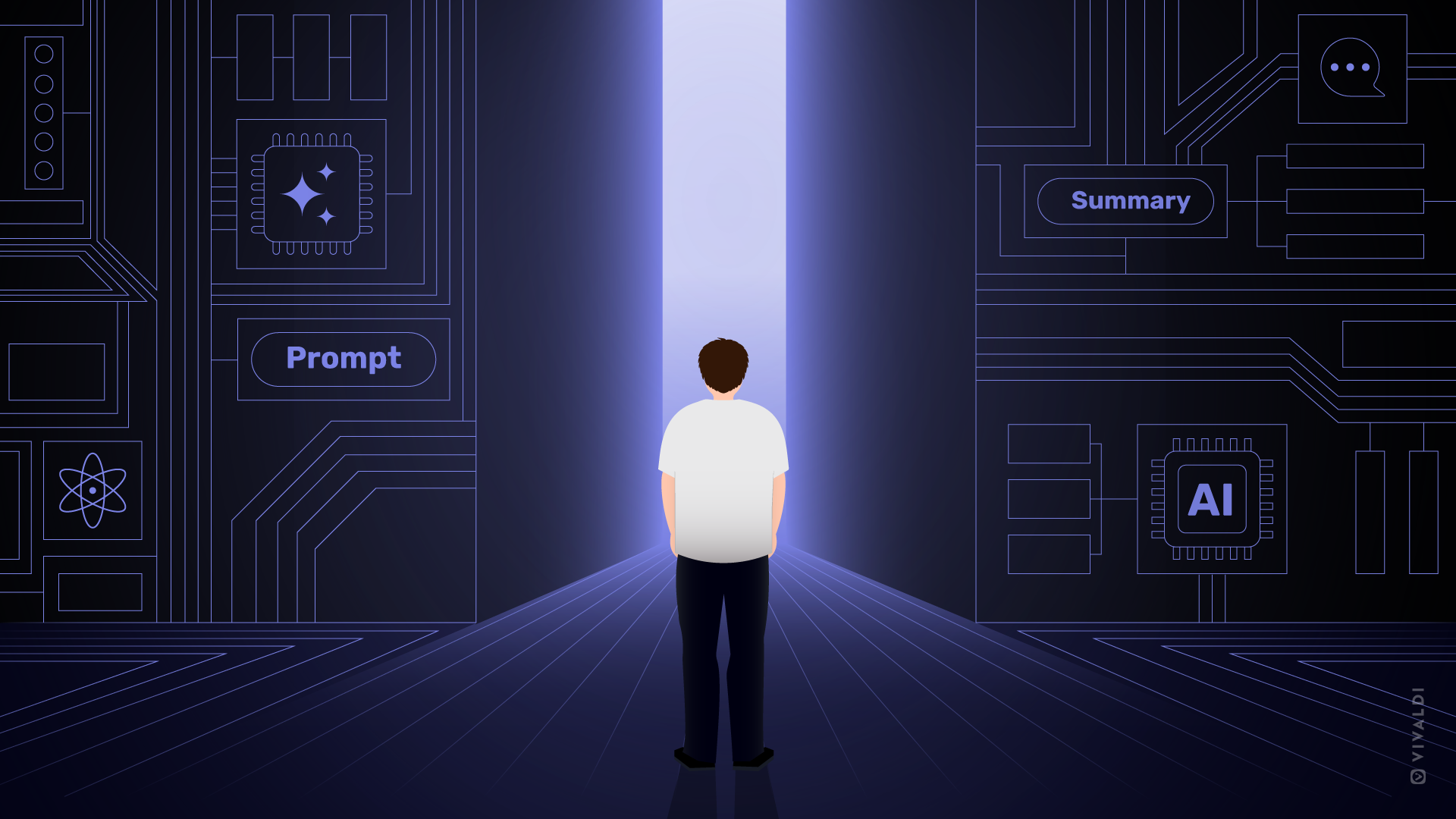Vivaldi takes a stand: keep browsing human
-
cross-posted from: https://programming.dev/post/36488277

Vivaldi takes a stand: keep browsing human | Vivaldi Browser
Browsing should push you to explore, chase ideas, and make your own decisions. It should light up your brain. Vivaldi is taking a stand. We choose humans over…

Vivaldi Browser (vivaldi.com)
-
cross-posted from: https://programming.dev/post/36488277

Vivaldi takes a stand: keep browsing human | Vivaldi Browser
Browsing should push you to explore, chase ideas, and make your own decisions. It should light up your brain. Vivaldi is taking a stand. We choose humans over…

Vivaldi Browser (vivaldi.com)
tl;dr they're not using AI for obvious reasons
We will not use an LLM to add a chatbot, a summarization solution or a suggestion engine to fill up forms for you, until more rigorous ways to do those things are available.
Vivaldi is the haven for people who still want to explore. We will continue building a browser for curious minds, power users, researchers, and anyone who values autonomy. If AI contributes to that goal without stealing intellectual property, compromising privacy or the open web, we will use it. If it turns people into passive consumers, we will not.
-
cross-posted from: https://programming.dev/post/36488277

Vivaldi takes a stand: keep browsing human | Vivaldi Browser
Browsing should push you to explore, chase ideas, and make your own decisions. It should light up your brain. Vivaldi is taking a stand. We choose humans over…

Vivaldi Browser (vivaldi.com)
Now I only need full ublock origin support on android and it's golden.
-
Now I only need full ublock origin support on android and it's golden.
You already can have that
 Ironfox (Firefox Librewolf-style android fork) is the easiest option (uBlock origin integrated), but you can also use the normal firefox browser with full extension support.
Ironfox (Firefox Librewolf-style android fork) is the easiest option (uBlock origin integrated), but you can also use the normal firefox browser with full extension support. -
tl;dr they're not using AI for obvious reasons
We will not use an LLM to add a chatbot, a summarization solution or a suggestion engine to fill up forms for you, until more rigorous ways to do those things are available.
Vivaldi is the haven for people who still want to explore. We will continue building a browser for curious minds, power users, researchers, and anyone who values autonomy. If AI contributes to that goal without stealing intellectual property, compromising privacy or the open web, we will use it. If it turns people into passive consumers, we will not.
A position on AI says next to nothing about one's stance on humanity, right?
-
cross-posted from: https://programming.dev/post/36488277

Vivaldi takes a stand: keep browsing human | Vivaldi Browser
Browsing should push you to explore, chase ideas, and make your own decisions. It should light up your brain. Vivaldi is taking a stand. We choose humans over…

Vivaldi Browser (vivaldi.com)
wish they would change to gecko though
-
Now I only need full ublock origin support on android and it's golden.
You can add the block lists manually via Vivaldi's built in blocker feature
uAssets/filters at master · uBlockOrigin/uAssets
Filter lists for uBlock Origin & uBlock Origin Lite - uAssets/filters at master · uBlockOrigin/uAssets
GitHub (github.com)

-
cross-posted from: https://programming.dev/post/36488277

Vivaldi takes a stand: keep browsing human | Vivaldi Browser
Browsing should push you to explore, chase ideas, and make your own decisions. It should light up your brain. Vivaldi is taking a stand. We choose humans over…

Vivaldi Browser (vivaldi.com)
If AI contributes to that goal without stealing intellectual property, compromising privacy or the open web, we will use it. If it turns people into passive consumers, we will not.
So they didn’t really make a stand.
-
If AI contributes to that goal without stealing intellectual property, compromising privacy or the open web, we will use it. If it turns people into passive consumers, we will not.
So they didn’t really make a stand.
They are selling a product that's just chrome with a fancy skin. The only stance they have is praising google and lying to it's users claiming to be better
-
You already can have that
 Ironfox (Firefox Librewolf-style android fork) is the easiest option (uBlock origin integrated), but you can also use the normal firefox browser with full extension support.
Ironfox (Firefox Librewolf-style android fork) is the easiest option (uBlock origin integrated), but you can also use the normal firefox browser with full extension support.Firefox (and thus also the forks) is missing a couple features since the rewrite 5 years ago. The biggest one for me is lack of keyboard shortcuts.
Also it becomes painfully slow on some more complex websites and dark reader is not nearly as good as the dark mode in Vivaldi.
Because of that I only use FF on websites that don't work on Vivaldi.
-
You can add the block lists manually via Vivaldi's built in blocker feature
uAssets/filters at master · uBlockOrigin/uAssets
Filter lists for uBlock Origin & uBlock Origin Lite - uAssets/filters at master · uBlockOrigin/uAssets
GitHub (github.com)

Sadly that doesn't work as good as ublock, especially for adblock blocker blocking.
There are some websites that just don't work with that setup.
-
They are selling a product that's just chrome with a fancy skin. The only stance they have is praising google and lying to it's users claiming to be better
“Selling”?
-
wish they would change to gecko though
Even Mozilla doesn’t really want Gecko anymore, that’s why they started Servo.
-
Even Mozilla doesn’t really want Gecko anymore, that’s why they started Servo.
Can anybody tell me why no one uses webkit?
-
Can anybody tell me why no one uses webkit?
There are some very minor browser that use webkit.






